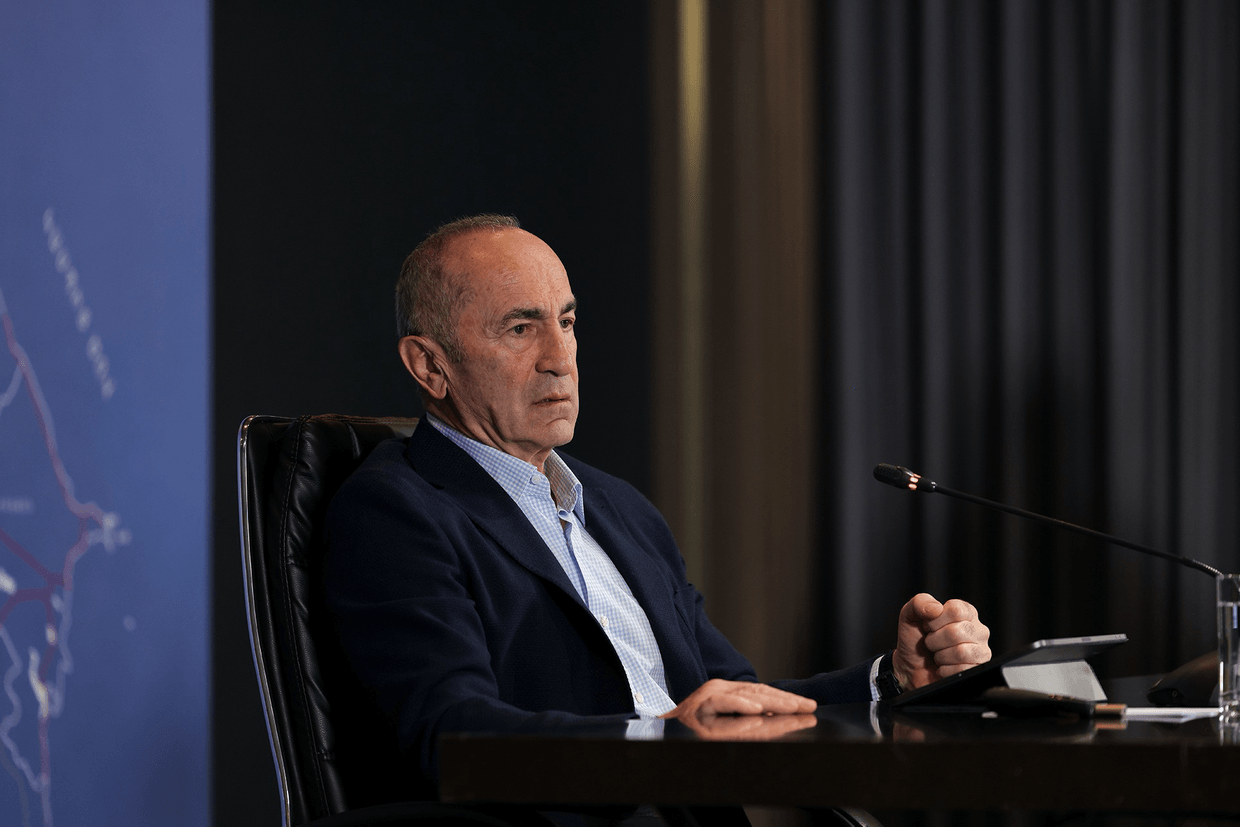
On Monday, Robert Kocharyan, Armenia’s second president and the current head of the opposition Armenia Alliance faction, blamed Armenia for Russia’s inaction in Nagorno-Karabakh and the Collective Security Treaty Organisation’s (CSTO) lack of response following Azerbaijan’s assault on Armenia in 2022.
Kocharyan’s statements came during an extensive press briefing, during which he said that ‘the only way to return’ Nagorno-Karabakh Armenians to the region was to ‘adhere to the 9 November statement’, which put an end to the Second Nagorno-Karabakh War.
Kocharyan suggested that if Azerbaijan demands a road to connect to its exclave Nakhchivan, referring to the 9 November statement, then Armenia could use it as a negotiating point to demand the return of Nagorno-Karabakh Armenians to Nagorno-Karabakh.
He also stated that no Nagorno-Karabakh Armenian would return to the region ‘without any international guarantees’.
Armenia ‘betrayed’ Russia
Prime Minister Nikol Pashinyan announced in parliament on 12 February that in 2019, there was a document on the negotiating table relating to talks about Nagorno-Karabakh. He previously had denied the existence of such a document.
In response, Kocharyan stated that by rejecting the ‘very interesting and acceptable’ proposal from 2019, Pashinyan ‘brought [the negotiation process] to a deadlock’.
Referring to Pashinyan’s statement in August 2019 in Stepanakert, during which he said that ‘Artsakh [Nagorno-Karabakh] is Armenia, the end’, Kocharyan said that such a statement was a ‘call to war’.
Pashinyan’s recognition of the territorial integrity of Azerbaijan in October 2022 in Prague, according to Kocharyan, was the start of the second phase of the ‘handover’ of Nagorno-Karabakh.
‘This was a verdict on [Nagorno-Karabakh]. This decision nullified Russia’s mediation mandate’, Kocharyan said.
Addressing the dissatisfaction of Armenians regarding Russia’s failure to fulfil its obligations in Nagorno-Karabakh, Kocharyan claimed it was Armenia’s fault, suggesting that his listeners look at the situation from a Russian standpoint.
‘You can stop what is happening in Nagorno-Karabakh only by forceful intervention, otherwise, it was simply impossible. Forceful intervention for whom — for Armenia, which at a fateful moment, to put it bluntly, has betrayed you, which has joined the camp of your enemies. I don’t think any of you will enter the fight for a friend who betrayed you’, Kocharyan said.
‘This was a fatal mistake’, he continued, insisting that ‘we have all paid this price with the loss of Artsakh’.
Around 2,000 Russian peacekeepers were deployed to Nagorno-Karabakh as part of the ceasefire agreement that brought an end to the Second Nagorno-Karabakh War in 2020. The peacekeepers were in theory there to provide security for the region’s population of roughly 100,000 ethnic Armenians.
Kocharyan also claimed that at that time, there was ‘a proxy war against Russia in Ukraine’, and ‘in that unstable situation, instead of strengthening the security system, filling it with the Persian factor for ourselves [referring to Iran’s perspective on regional issues], we began to mercilessly destroy the system that more or less ensured peace in [Nagorno-Karabakh]’.
Responding to the question of why Russia did not interfere during Azerbaijan’s invasion of Armenia’s sovereign territory in September 2022, Kocharyan said that ‘no one can say that Armenia turned to Russia in the context of bilateral relations’.
He additionally stated that Armenia itself ‘discredited the CSTO’, calling the country’s attitude towards the CSTO ‘unacceptable’.
Moreover, he claimed that ‘if you yourself do not fight for those territories, no one will fight for you’.
‘If you are not just defeated in the war but already on your knees, no one will come to fight alongside you because you are no longer seen as a partner, a reliable partner, this is the reason’, Kocharyan said.
The CSTO is a defence bloc fronted by Russia. Armenia ‘froze’ its membership in the organisation citing its refusal to aid Armenia in the face of Azerbaijani attacks in 2021 and 2022.

No one awaits Armenia in the EU
Kocharyan also noted that Armenia chose ‘the most dangerous moment […] to change the geopolitical vector’, referring to a draft law supporting Armenia’s prospective EU membership bid that passed its first reading in the Armenian Parliament in early February.
‘We are trying to change our direction, our geopolitical vector, towards the centre that is clearly weakening, and away from the centre that is strengthening’, Kocharyan said.
He also insisted that even though the EU would not collapse, it was facing crises which would entail reforms, during which all accession processes would be frozen, insisting that there was ‘no prospect’ for Armenia’s membership.
‘You are going to a place where you are not expected at all. You are going to a place that is already quite problematic in itself, [...] By doing so, you are drastically ruining your relations in the system where you are today’, Kocharyan said, referring to Armenia’s membership in the Russian-led Eurasian Economic Union.
‘You cannot sit on two chairs, those two chairs are very far from each other’, Kocharyan said, viewing the accession discussion as part of the pre-election period.
Kocharyan’s statements were met with harsh criticism from the ruling Civil Contract party.‘Kocharyan says that Armenia betrayed Russia and sided with Russia's enemies, and that's why Russia did not intervene and silently watched the ethnic cleansing of Nagorno-Karabakh,’ Vahagn Aleksanyan, an MP from the ruling party, wrote, adding that ‘these are not the words of the former president of Armenia, but of a “junior officer” of the Russian special services, who is trying in every way to justify the masters he serves’.










